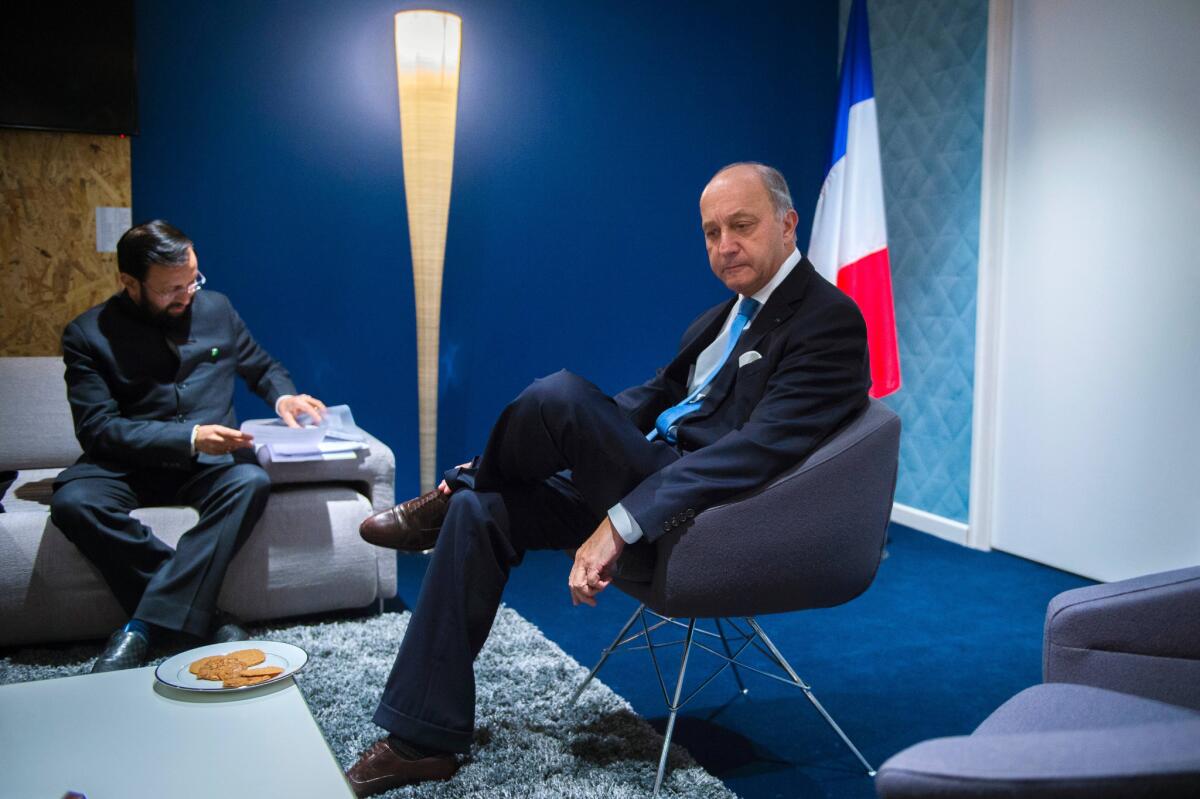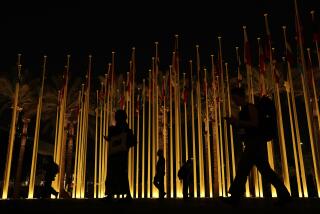Climate change deal will have to wait a day as talks are extended

French Foreign Affairs Minister Laurent Fabius, right, meets with Indian Environment Minister Prakash Javadekar at the COP 21 U.N. Conference on climate change.
- Share via
Reporting from Le Bourget, France — With negotiators still deadlocked on key issues, French Foreign Minister Laurent Fabius said Friday that it would take another day to finalize a global agreement to fight climate change.
Fabius, who has been leading nearly two weeks of talks, said he would submit what he expects will be the final draft for adoption at a United Nations conference outside Paris on Saturday, not Friday as planned.
Such meetings often run into overtime, and Fabius appeared confident that a deal remained in sight.
“The atmosphere is good, things are positive, things are going in the right direction, but there is still work to do,” he told French television.
Secretary of State John F. Kerry said he and others had been “working quietly behind the scenes to work out compromises” and he thought it possible that a deal might be finalized sometime Saturday.
The decision to give delegates more time came after another round of all-night negotiations. Fabius has tried to prod participants toward compromise, but difficult disputes remain on issues that have divided countries for years.
These include how ambitious the accord should be, how to address the cost of fighting climate change and how to define the obligations of countries in different stages of development.
China, the world’s biggest polluter, has been resisting a push by the United States and its allies for all nations to be subject to the same requirements to regularly review their plans for curbing greenhouse gas emissions and verify that they are living up to their commitments.
Beijing has said that its emissions will peak in 2030, if not sooner, and has been reluctant to revisit the target. The country argues that developing nations should be treated differently than those that grew wealthy by using fossil fuels such as oil, gas and coal.
Liu Zhenmin, China’s vice foreign minister, said the issue remains “at the core of our concern.”
He chuckled when asked about the “high ambition coalition,” a group of countries including the U.S., European Union and some vulnerable island nations that have banded together to seek a more aggressive agreement.
“Our commitments have also been very ambitious,” Liu said.
But he argued that developing nations should have greater flexibility about when to ramp up their commitments.
“We need heating. We need air conditioner. And you need to drive your car,” Liu said. “Changing your lifestyle takes time.”
U.N. Secretary-General Ban Ki-moon acknowledged that the talks had been difficult but said he was encouraged by the progress that had been made. He urged negotiators to set aside national interests and make decisions in the coming hours based on a “global vision.”
Zavis reported from Paris and Megerian from Le Bourget.
Twitter: @alexzavis
Twitter: @chrismegerian
More to Read
Sign up for Essential California
The most important California stories and recommendations in your inbox every morning.
You may occasionally receive promotional content from the Los Angeles Times.















